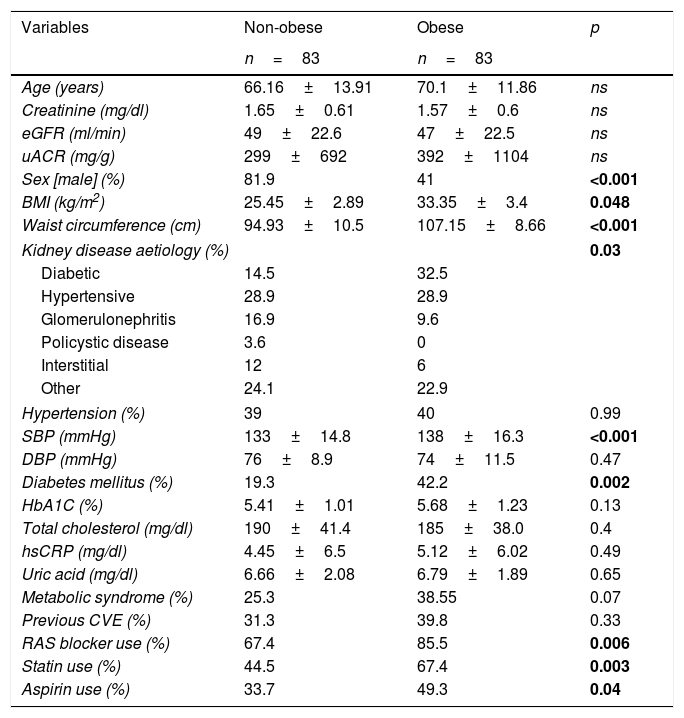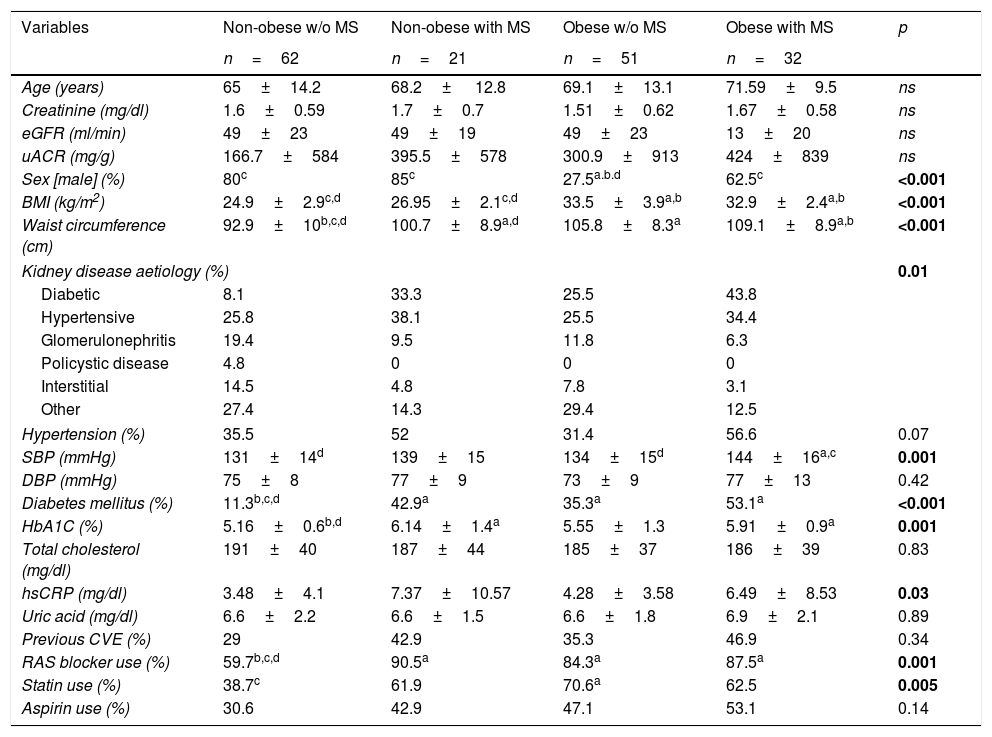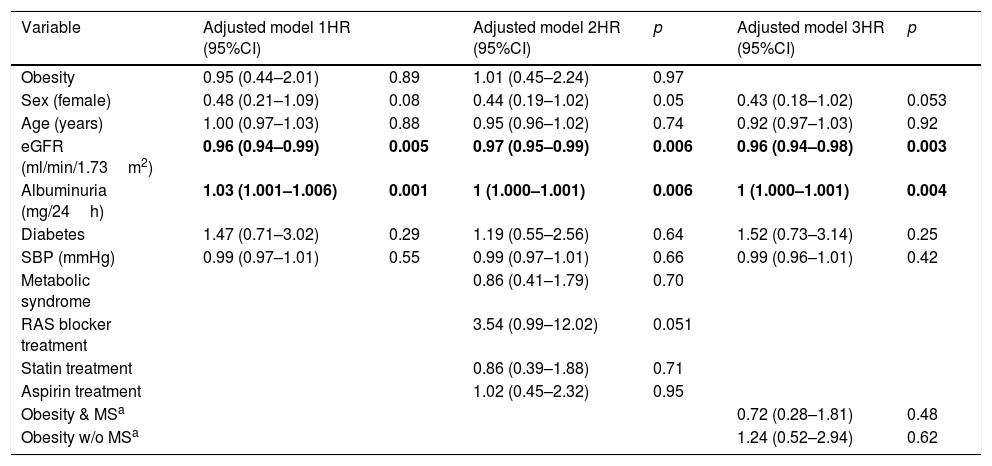Obesity is a major health problem worldwide. It carries a markedly increased risk for multiple diseases such as type 2 diabetes mellitus, hypertension, cardiovascular disease (CVD) and chronic kidney disease (CKD). To complicate an already difficult topic a new subtype of obesity has been defined lately, the metabolically healthy obese. Our study aimed to clarify the association between obesity, metabolic syndrome and kidney disease progression.
MethodsObservational retrospective single centre study including 212 patients with stage 3–4 CKD with no previous history of rapid kidney disease progression. Patients were divided according to BMI status and presence of metabolic syndrome. Anthropometric, clinical and laboratory data were collected to follow-up. Propensity score matching was performed for age, albuminuria and baseline renal function. During follow-up renal and cardiovascular events were recorded.
ResultsAfter a mean follow-up of 88.44±36.07 months a total of 18 patients reached the renal outcome in the non-obese group and 21 in the obese group. Differences were not statistically significant (log rank=0.21: p=0.64). Multiple Cox regression analysis showed that obesity was not predictor for worse renal outcomes [HR 1.01, 95% CI 0.45–2.24; p=0.97]. When stratifying the sample according to baseline metabolic syndrome and obesity presence there was no difference in renal survival (log rank=0.852; p=0.35)
A total of 48 cardiovascular events were registered: seventeen in the non-obese group and thirty-one in the obese group. Differences in event-free time between both groups were statistically significant (log rank=4.44;p=0.035), especially after four years of follow-up. After stratifying for MS and obesity presence at baseline the event-free time differences where again statistically significant (log rank=16.86;p=0.001), specially for the obese patients with metabolic syndrome.
ConclusionsObesity has little impact on chronic kidney disease progression despite the presence or absence of metabolic syndrome in a cohort matched for age, baseline renal function and albuminuria. Obesity conferred greater cardiovascular risk when combined with metabolic syndrome.
La obesidad es un problema mayor de salud a nivel mundial. Comporta un considerable incremento del riesgo de múltiples enfermedades tales como diabetes mellitus tipo 2, hipertensión, enfermedad cardiovascular (ECV) e insuficiencia renal crónica (IRC). Para complicar un tema ya difícil, se ha definido recientemente un nuevo subtipo de obesidad: el obeso metabólicamente sano. El objetivo de nuestro estudio fue aclarar la asociación entre obesidad, síndrome metabólico y progresión de la enfermedad renal.
MétodosEstudio observacional retrospectivo unicéntrico que incluyó a 212 pacientes con IRC estadio 3 a 4, sin antecedentes de progresión rápida de la enfermedad renal. Se dividió a los pacientes conforme a su situación de índice de masa corporal (IMC) y presencia de síndrome metabólico (SM). Durante el seguimiento se recopilaron los datos antropométricos, clínicos y de laboratorio. Se realizó el emparejamiento por puntaje de propensión (Propensity score matching) para edad, albuminuria y función renal nasal. Durante el seguimiento se registraron los episodios renales y cardiovasculares.
ResultadosTras un seguimiento medio de 88,44 ± 36,07 meses, un total de 18 pacientes logró el resultado renal en el grupo de no obesos, y 21 en el grupo de obesos. Las diferencias no fueron estadísticamente significativas (log rank=0,21: p = 0,64). El análisis de regresión múltiple de Cox mostró que la obesidad no era un factor predictivo para peores resultados renales [HR 1,01, IC95% 0,45–2,24; p 0,97]. Al estratificar la muestra con arreglo a síndrome metabólico basal y presencia de obesidad no existió diferencia en cuanto a la supervivencia renal (log rank = 0,852; p = 0,35).
Se registró un total de 48 episodios cardiovasculares: 17 en el grupo de no obesos y 31 en el grupo de obesos. Las diferencias en cuanto a tiempo libre de episodios entre ambos grupos fueron estadísticamente significativas (log rank = 4,44; p = 0,035), y en especial transcurridos cuatro años de seguimiento. Tras estratificar la presencia basal de SM y obesidad, las diferencias en cuanto a tiempo libre de episodios fueron de nuevo estadísticamente significativas (log rank = 16,86; p = 0,001), especialmente para los pacientes obesos con síndrome metabólico.
ConclusionesLa obesidad tiene poco impacto en la progresión de la insuficiencia renal crónica, a pesar de la presencia o ausencia de síndrome metabólico en una cohorte pareada por edad, función renal basal y albuminuria. La obesidad confirió un mayor riesgo cardiovascular, al combinarse con el síndrome de riesgo metabólico.











